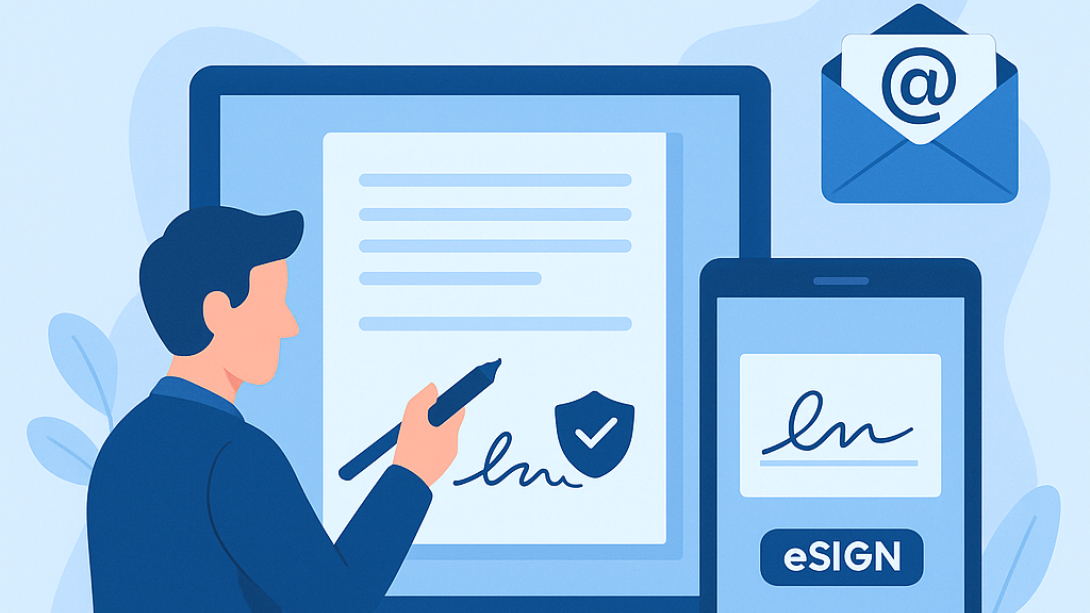Esignature Online Vs DSC in India: What’s the Difference & Which Should You Use?

In today’s fast-paced digital era, paperwork is being replaced with secure online solutions. Whether it’s signing contracts, verifying identities, or authorizing financial transactions, digital authentication tools are becoming essential for businesses and individuals alike. Two of the most common options available in India are eSign (Electronic Signature) and DSC (Digital Signature Certificate).
At first glance, both may seem the same since they serve the purpose of authenticating documents. However, there are significant differences in how they work, their level of security, and their use cases. This blog explores eSign vs DSC, their benefits, and how modern platforms like Meon are making Electronic Signature Services more accessible.
What is eSign?
eSign, short for Electronic Signature, is a digital method of signing documents online. It allows individuals to quickly sign agreements and forms without the need for physical paperwork. In India, eSign is usually Aadhaar-based, which means users authenticate their identity through Aadhaar OTP or biometric verification before applying their signature.
Key Features of eSign:
- Quick and Easy – Sign documents instantly using Aadhaar authentication.
- Remote Access – With e Signature Online, users can sign from anywhere, anytime.
- Legally Valid – Recognized under the IT Act, 2000 in India.
- Best for Everyday Use – Ideal for contracts, employee onboarding, service agreements, and similar tasks.
Platforms like Meon have made Electronic Signature Services more user-friendly by offering Aadhaar-based signing along with workflow automation and real-time tracking. This makes eSign a reliable choice for organizations looking to reduce manual paperwork.
What is DSC (Digital Signature Certificate)?
A Digital Signature Certificate (DSC) is a higher-level digital authentication tool issued by licensed certifying authorities in India. Unlike eSign, which is often Aadhaar-based, a DSC comes in the form of a physical USB token or software file that contains a person’s encrypted digital identity.
Key Features of DSC:
- Issued by Authorities – Licensed Certifying Authorities like eMudhra or Sify provide DSCs.
- Stronger Authentication – Uses encryption and public key infrastructure (PKI) to secure transactions.
- Mandatory for Certain Filings – Required for MCA (Ministry of Corporate Affairs) filings, GST returns, and income tax e-filing.
- Longer Validity – A DSC is usually valid for 1–2 years and can be renewed.
DSCs are essential for official government filings and corporate compliance. They provide a higher degree of security compared to Electronic Signature Online but are less convenient for everyday use.
eSign vs DSC: The Key Differences
While both Electronic Signatures (eSign) and Digital Signature Certificates (DSC) serve the purpose of authenticating documents, they differ significantly in how they work and where they are used.
An eSign is Aadhaar-based, relying on OTP or biometric verification to allow users to sign documents instantly. This makes it highly convenient and accessible through e Signature Online platforms like Meon. It’s ideal for day-to-day business needs such as contracts, HR documents, or vendor agreements. On the other hand, a DSC is issued by licensed Certifying Authorities and comes in the form of a USB token or software file. It uses public key infrastructure (PKI) encryption, offering stronger security but less convenience compared to eSign.
In terms of usage, Electronic Signature Services like eSign are best for everyday workflows, while DSC is mandatory for compliance-heavy tasks such as GST filings, MCA submissions, or income tax returns. Another difference lies in validity—eSign is valid per transaction, whereas a DSC typically remains valid for one to two years and must be renewed.
To sum it up: if you value speed, convenience, and easy online access, e Signature Services like eSign are the right choice. But if you’re dealing with strict legal filings or government transactions, a DSC provides the higher level of security and compliance required.
When Should You Use eSign?
eSign is perfect for situations where speed, accessibility, and convenience matter most. Examples include:
- Employee onboarding documents.
- Vendor contracts and agreements.
- Loan applications or insurance forms.
- E-commerce and online service approvals.
Thanks to e Signature Services offered by platforms like Meon, businesses can integrate eSign directly into their workflows. This ensures documents move faster without compromising security.
When Should You Use DSC?
A Digital Signature Certificate is necessary when compliance and strict legal requirements are involved. You’ll need a DSC for:
- Filing GST returns and corporate documents with MCA.
- Signing official government tenders.
- Filing income tax returns on behalf of businesses.
- High-value legal or financial transactions.
While less convenient than e Signature Online, DSCs are indispensable for government filings and heavy regulatory environments.
Which One is Right for You?
The choice between Electronic Signature and DSC depends on your needs:
- If you’re a business looking for speed, simplicity, and efficiency, eSign is the way to go. It’s widely adopted across industries and supported by leading Electronic Signature Services providers.
- If you’re dealing with statutory filings or require stronger encryption for compliance, a DSC is essential.
Most organizations use both—eSign for daily documentation and DSC for compliance-related filings.
Conclusion
Both eSign and DSC play critical roles in India’s digital ecosystem. Electronic Signature Online options like Meon make eSign fast, accessible, and cost-effective, making them perfect for everyday business transactions. On the other hand, DSCs provide a higher level of trust and are mandatory for government and regulatory filings.
In short:
- eSign = Convenience and speed for daily workflows.
- DSC = Security and compliance for regulatory filings.
As businesses embrace digital transformation, adopting both e Signature Services and DSC ensures smoother, safer, and legally valid operations.